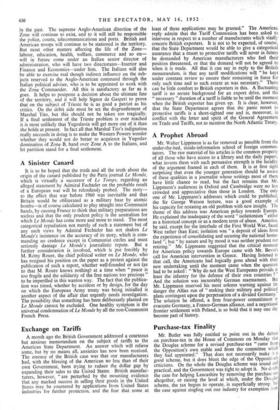Exchange on Tariffs
A month ago the British Government addressed a courteous but anxious memorandum on the subject of tariffs to the American State Department. An answer which will relieve some, but by no means all, anxieties has now been received. The essence of the British case was that our manufacturers had, with the blessing of the American no less than of their own Government, been trying to reduce the dollar gap by expanding their sales to the United States. British manufac- turers, however, "are perturbed by the mounting evidence that any marked success in selling their goods in the United States may be countered by applications from United States industries for further protection, and the fear that some at least of these applications may be granted." The American reply admits that the Tariff Commission has been asked to intervene in respect to a number of manufactures which vitally concern British exporters. It is not to be expected, of course, that the State Department would be able to give a categorical assurance that a resort to protective tariffs will never in future be demanded by American manufacturers who feel their position threatened, or that the demand will not be agreed to when it is made. All that it can say in reply to the British memorandum, is that any tariff modifications will "be kept under constant review to ensure their remaining in force for only such time and to such extent as was necessary." There can be little comfort to British exporters in this. A fluctuating tariff is no secure background for an export drive, and the "necessary " duration of a tariff is liable to be until the moment when the British exporter has given up. It is clear, however, that the State Department agrees that the panic resort to protective tariffs is a short-sighted one and is, moreover, in conflict with the letter and spirit of the General Agreement on Trade and Tariffs, not to mention the North Atlantic Treaty.


































 Previous page
Previous page